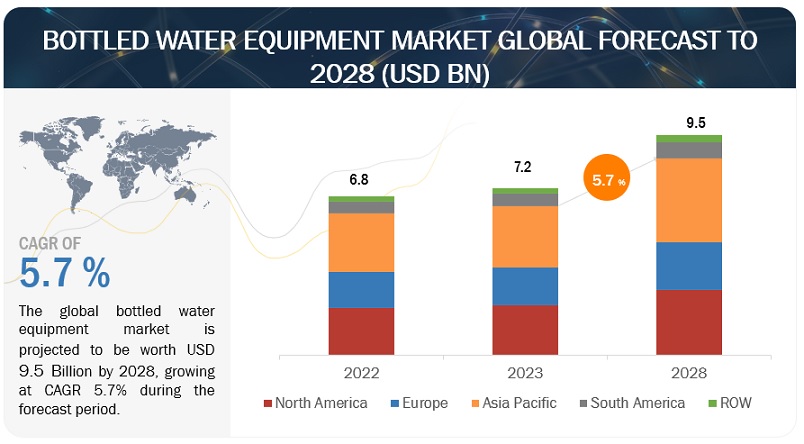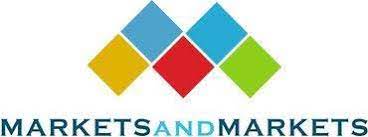According to a research report “Bottled Water Processing Market by Product Type (Still Water and Sparkling Water), Packaging Material, Technology (Ion Exchange & Demineralization, Disinfection, Filtration, and Packaging), Equipment and Region – Global Forecast to 2028″ published by MarketsandMarkets, the bottled water processing market comprises the bottled water market and the bottled water equipment market. The bottled water market is projected to reach USD 457.1 billion by 2028 from USD 311.1 billion by 2023, at a CAGR of 8.0% during the forecast period in terms of value. The bottled water equipment market is projected to reach USD 9.5 billion by 2028 from USD 7.2 billion by 2023, at a CAGR of 5.7% during the forecast period in terms of value. In the bottled water processing market, the heightened demand in emerging markets stems from challenges related to limited access to safe drinking water, prompting consumers to turn to processed bottled water for a reliable and convenient solution. Simultaneously, the increasing global population amplifies the need for bottled water processing as a crucial component in addressing the growing demand for clean and safe drinking water on a larger scale, emphasizing the market’s role in providing accessible and trustworthy hydration solutions.

Download PDF Brochure: https://www.marketsandmarkets.com/pdfdownloadNew.asp?id=73331968
By product type, still water accounted for the largest share in 2022 in terms of value in the bottled water market
Still water caters to consumers seeking a pure and straightforward hydration option, free from added flavors or bubbles. Its popularity is driven by a growing emphasis on health and wellness, as consumers recognize the benefits of staying hydrated with a clean and non-caloric beverage. The still water segment continues to capture a significant share of the bottled water market, reflecting the preferences of a diverse consumer base looking for a simple, refreshing, and unadulterated source of hydration.
By packaging material, the plastic segment is estimated to grow at a higher rate in the bottled water market
The plastic packaging material segment plays a central role in the bottled water market, serving as the predominant choice for packaging due to its versatility, convenience, and cost-effectiveness. Polyethylene terephthalate (PET) is the most commonly used plastic for bottled water containers, offering a lightweight and durable solution that is well-suited for the demands of the beverage industry. While concerns about plastic waste and environmental impact have prompted increased scrutiny, the plastic packaging segment has responded with a focus on recyclability and sustainability. Many bottled water companies are investing in the development of eco-friendly packaging, such as recycled PET (rPET) bottles, and initiatives to increase overall recyclability. These efforts aim to address environmental concerns associated with single-use plastics and reduce the carbon footprint of bottled water.
For instance, in October 2023, The Coca-Cola Company achieved a significant milestone in its sustainable packaging journey by introducing its first-ever beverage bottle made entirely from 100% plant-based plastic, excluding the cap and label. This innovative prototype, created with technologies ready for commercial scale, marks a crucial advancement in Coca-Cola’s commitment to environmentally friendly packaging. The prototype bottle is a notable development following the earlier introduction of Coca-Cola’s PlantBottle in 2009, which was the world’s first recyclable PET plastic bottle made with up to 30% plant-based material. However, this new achievement surpasses its predecessor by utilizing plant-based paraxylene (bPX), derived from sugar from corn, to produce plant-based terephthalic acid. This process represents a substantial shift in the sourcing of materials, moving away from oil-based sources for the entire bottle composition. The plant-based composition of the new Coca-Cola bottle is a significant step towards a lower carbon footprint, aligning with consumer preferences for sustainable and eco-friendly products. By employing plant-based materials, Coca-Cola contributes to reducing reliance on traditional plastics and addressing environmental concerns associated with plastic waste. This breakthrough signals a shift in the commercial viability of biomaterials, setting the stage for future advancements in sustainable packaging within the beverage industry.
Make an Inquiry: https://www.marketsandmarkets.com/Enquiry_Before_BuyingNew.asp?id=73331968
By equipment, the filters segment is estimated to grow at the highest rate in the bottled water equipment market.
Filters are essential components within the water processing and purification system, designed to remove impurities, contaminants, and particles from the water source. These filtration systems contribute significantly to meeting regulatory standards and producing water that adheres to high-quality benchmarks. Water filters employed in the bottled water industry typically utilize various technologies, including activated carbon, reverse osmosis, and micron filtration, among others. Activated carbon filters, for instance, excel in eliminating organic impurities and improving taste, while reverse osmosis systems are effective in removing microscopic contaminants and ensuring water clarity.
As consumers increasingly prioritize clean and pure water, the demand for advanced filtration technologies has surged. Bottled water manufacturers invest in state-of-the-art filter equipment to enhance the quality of their products, meeting the stringent expectations of discerning consumers. The effectiveness of filters not only influences the safety and taste of bottled water but also contributes to building consumer trust and loyalty in a competitive market.
The Asia Pacific region accounted for the largest share in 2022 in terms of value.
The Asia Pacific region is witnessing a surge in the adoption of innovative and sustainable bottled water processing technologies. With a growing awareness of environmental concerns related to single-use plastics, there is an increasing emphasis on developing eco-friendly packaging solutions and promoting recycling initiatives. This reflects a broader trend in the region towards environmentally responsible consumption, influencing both consumer choices and industry practices within the bottled water processing market. Government initiatives and regulations regarding water quality standards and safety further contribute to the evolution of the bottled water processing landscape in the Asia-Pacific region. As regulatory frameworks become more stringent, manufacturers are compelled to invest in advanced processing technologies to meet compliance requirements and ensure the production of high-quality, safe drinking water. Additionally, the diversity of the Asia Pacific market extends to the types of bottled water consumed, including purified water, mineral water, and functional or enhanced water products.
Key players operating in bottled water equipment market include DuPont (US), GEA Group Aktiengesellschaft (Germany), Alfa Laval (Sweden), 3M (US), Veolia (France), SPX FLOW, Inc. (US), Pall Corporation (US), Pentair (US), Porvair Filtration Group (UK) and TORAY INDUSTRIES, INC. (Japan). And for the bottled water market includes Nestlé (Switzerland), The Coca-Cola Company (US), PepsiCo (US), Danone (France), Nongfu Spring (China), Tata Consumer Products Limited (India), National Beverage Corp. (US), Keurig Dr Pepper Inc. (US), Gerolsteiner Brunnen GmbH & Co. KG (Germany) and CG Roxane, LLC (US). These players in this market are focusing on increasing their presence through expansion and collaboration. These companies have a strong presence in North America, Asia Pacific, and Europe.
Get 10% Free Customization on this Report: https://www.marketsandmarkets.com/requestCustomizationNew.asp?id=73331968
About MarketsandMarkets™
MarketsandMarketsTM has been recognized as one of America’s best management consulting firms by Forbes, as per their recent report.
MarketsandMarkets™ is a blue ocean alternative in growth consulting and program management, leveraging a man-machine offering to drive supernormal growth for progressive organizations in the B2B space. We have the widest lens on emerging technologies, making us proficient in co-creating supernormal growth for clients.
Earlier this year, we made a formal transformation into one of America’s best management consulting firms as per a survey conducted by Forbes.
The B2B economy is witnessing the emergence of $25 trillion of new revenue streams that are substituting existing revenue streams in this decade alone. We work with clients on growth programs, helping them monetize this $25 trillion opportunity through our service lines – TAM Expansion, Go-to-Market (GTM) Strategy to Execution, Market Share Gain, Account Enablement, and Thought Leadership Marketing.
Built on the ‘GIVE Growth’ principle, we work with several Forbes Global 2000 B2B companies – helping them stay relevant in a disruptive ecosystem. Our insights and strategies are molded by our industry experts, cutting-edge AI-powered Market Intelligence Cloud, and years of research. The KnowledgeStore™ (our Market Intelligence Cloud) integrates our research, facilitates an analysis of interconnections through a set of applications, helping clients look at the entire ecosystem and understand the revenue shifts happening in their industry.
Media Contact
Company Name: MarketsandMarkets™ Research Private Ltd.
Contact Person: Mr. Aashish Mehra
Email: Send Email
Phone: 18886006441
Address:630 Dundee Road Suite 430
City: Northbrook
State: IL 60062
Country: United States
Website: https://www.marketsandmarkets.com/Market-Reports/bottled-water-processing-market-73331968.html
Press Release Distributed by ABNewswire.com
To view the original version on ABNewswire visit: Bottled Water Processing Market worth $466.55 billion by 2028 | Key Players are DuPont, Alfa Laval, 3M, Pall Corporation, Pentair, Porvair Filtration Group, Nestlé, The Coca-Cola Company, and PepsiCo
